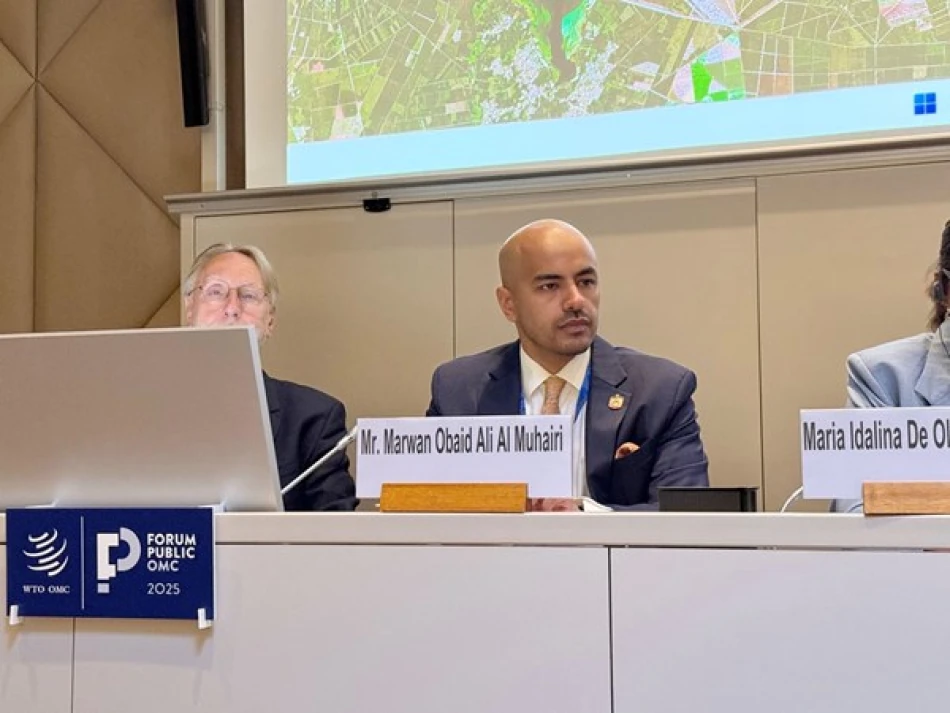
UAE Leads Digital Trade Session at World Trade Organization Parliamentary Conference in Geneva
UAE Spearheads Global Push for Digital Trade Rules as WTO Reform Gains Momentum
The UAE has positioned itself at the forefront of international efforts to establish binding frameworks for digital commerce, chairing a high-level parliamentary session in Geneva that underscored the urgent need for multilateral cooperation in governing cross-border digital trade. The move signals growing recognition that traditional trade rules are inadequate for the digital economy era, with parliaments worldwide under pressure to craft legislation that can keep pace with technological innovation.
Parliamentary Leadership in Digital Trade Governance
Dr. Marwan Obaid Al Muhairi, representing the UAE's Federal National Council at the International Parliamentary Union, led the session titled "Parliamentarians and Enhancing Multilateralism through Digital Trade" during the World Trade Organization's Parliamentary Conference. The event, jointly organized by the European Parliament and the International Parliamentary Union, brought together lawmakers, policymakers, and international experts to address the regulatory gaps in digital commerce.
Al Muhairi emphasized the critical role parliaments must play in supporting international efforts to establish binding and effective rules for digital trade, highlighting the necessity of continued WTO reform to meet member states' evolving requirements while maintaining multilateral trade as a cornerstone of global economic stability.
The Digital Trade Regulatory Challenge
Breaking Down Cross-Border Barriers
The session focused on parliaments' responsibility to pursue legislative initiatives that eliminate obstacles to cross-border digital trade while enhancing digital trust. This approach aims to empower entrepreneurs and consumers while supporting the flourishing digital economy—a sector that has grown exponentially since the COVID-19 pandemic accelerated digital transformation globally.
The emphasis on digital trust reflects growing concerns about data privacy, cybersecurity, and platform governance that have complicated international digital commerce. Unlike traditional goods trade, digital services face complex jurisdictional challenges where data flows, intellectual property rights, and consumer protection standards vary dramatically between countries.
Market and Investment Implications
For investors and digital platforms, the UAE's leadership in this space represents a significant development. The country has already established itself as a regional fintech and e-commerce hub, with initiatives like the Dubai International Financial Centre's digital asset regulations and the UAE's comprehensive digital transformation strategy.
The push for standardized digital trade rules could benefit:
• Cross-border e-commerce platforms seeking regulatory clarity
• Fintech companies navigating multiple jurisdictions
• Cloud service providers managing data localization requirements
• Digital payment processors handling international transactions
Regional Competition and Global Context
The UAE's proactive stance mirrors similar efforts by Singapore, which has pioneered digital trade agreements with countries like Australia and the UK. Both nations recognize that early leadership in digital trade governance can provide competitive advantages in attracting tech companies and digital nomads.
This contrasts with the more fragmented approach seen in larger economies, where the US and EU have pursued separate digital governance frameworks—the US favoring minimal regulation and free data flows, while the EU emphasizes privacy protection and platform accountability through legislation like the Digital Services Act.
WTO Reform: Necessity or Inevitability?
The call for WTO reform reflects broader frustrations with the organization's inability to address 21st-century trade challenges. The WTO's dispute resolution mechanism has been paralyzed since 2019, and its rules largely predate the digital economy.
Al Muhairi's emphasis on multilateralism as a "strategic choice ensuring stability and balance in the international trading system" suggests the UAE views coordinated reform as preferable to the current patchwork of bilateral digital trade agreements. This approach could help smaller nations avoid being squeezed between competing regulatory blocs led by major powers.
The success of such multilateral efforts will likely depend on whether major economies can reconcile their different approaches to digital governance—a challenge that extends far beyond trade policy into fundamental questions about data sovereignty, platform power, and the role of government in the digital economy.
Most Viewed News

 Layla Al Mansoori
Layla Al Mansoori






